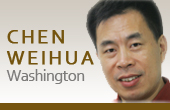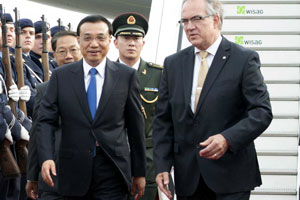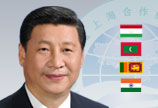Chinese FM meets officials to attend intl conference on Afghanistan
(Xinhua) Updated: 2014-10-31 09:11BEIJING - Chinese Foreign Minister Wang Yi here Thursday met with senior officials to attend the Fourth Foreign Ministerial Conference of the Istanbul Process on Afghanistan in Beijing, slated to open on Friday.
When meeting with his Afghan counterpart Zarar Ahmad Osmani, Wang hoped the meeting to bear positive results.
Wang and Osmani will co-chair the 4th Foreign Ministers' Meeting of the Istanbul Process on Afghanistan.
Hailing the successful visit of Afghan President Ashraf Ghani Ahmadzai to China this week, Wang said Chinese and Afghan leaders reached consensus on deepening bilateral ties, which charted the course of the future development of the relationship and made the plan of bilateral cooperation in various areas.
"This shows the support China gives to Afghanistan and the importance China attaches to the relationship," Wang told Osmani.
He called on both sides to implement the consensus so as to further promote bilateral relations.
Afghanistan is currently facing with three major tasks of political reconciliation, economic reconstruction and security transition, said Wang. The future of Afghanistan is owned by the Afghan people, but also relies on supports from the international community and neighboring countries, he added.
Osmani said he believed that the current China visit of Afghan president would deepen traditional friendship between the two countries and intensify bilateral cooperation.
He thanked China for hosting the meeting, adding that Afghanistan is willing to closely cooperate with China on the meeting.
Ghani is paying a four-day state visit to China since Tuesday, his first foreign visit since taking office last month.
The meeting of the Istanbul Process on Afghanistan is the first significant international conference on Afghanistan since the sworn-in of the new Afghan government in late September.
Foreign Ministers and high-level representatives from the member states and supporting parties of the Istanbul Process will attend the meeting, according to the Chinese Foreign Ministry.
"By hosting this conference, China hopes to showcase the world's support to the peaceful reconstruction in Afghanistan, and build consensus of regional countries on strengthening cooperation on Afghanistan and jointly safeguarding security and stability in Afghanistan and the region," Foreign Ministry spokeswoman Hua Chunying said last week.
Also on Thursday, Wang met with the top UN envoy to Afghanistan Jan Kubis, who is also here to attend the meeting.
Wang said China hopes the meeting could send a clear signal that the international community supports the political reconciliation process of Afghanistan, and would help the war-torn country to enhance capacity-building, "as this is the key to realize an Afghanistan governed by the Afghan people."
"China supports the United Nations in continuing to stay in Afghanistan and play a bigger role, " Wang said.
Kubis said the new Afghan president's China visit and the foreign ministers' meeting here are welcomed and valued by the international community.
The United Nations is willing to work with China to help Afghanistan realize national peace, stability, development and reconciliation.
When meeting with John Podesta, Counselor to US President Barack Obama, Wang said that "to realize lasting peace and sustainable development for Afghanistan serves our mutual interests and the interests of the international community."
"China is willing to strengthen communication and cooperation with the US to play a constructive role facilitating political reconciliation, peace and reconstruction in Afghanistan, " Wang said.
Podesta, also head of the US delegation to the Istanbul Process meeting, said the US appreciates the valuable support that China has given to the new Afghan government and its effort for a successful meeting in Beijing. He said the US is willing to work with China to promote peace, stability and prosperity in Afghanistan.
Wang also met with foreign ministers or senior diplomatic officials from Pakistan, Turkmenistan, Tajikistan and Kyrgyzstan.
The meeting will take place on Friday, amid Afghanistan's new president Ashraf Ghani Ahmadzai's state visit to China.
In November 2011, China, Russia, Afghanistan and Central Asian countries reached an agreement in Turkey known as the Istanbul Process, presenting a new vision for regional cooperation for a secure and stable Afghanistan.










